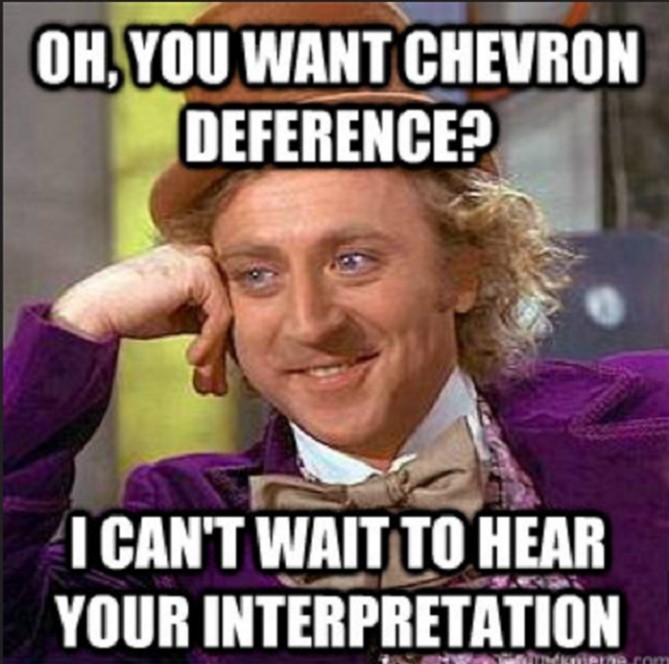SCOTUS GRANTS REVIEW OF CASE THAT WILL GUT THE FEDERAL BUREAUCRACY
 In the biggest news to come out of the Supreme Court of the United States since Roe v. Wade was overturned, the Court has granted a review of Loper Bright Enterprises vs. Raimondo.
In the biggest news to come out of the Supreme Court of the United States since Roe v. Wade was overturned, the Court has granted a review of Loper Bright Enterprises vs. Raimondo.
In its deliberations, the court will deal with the question of whether to overrule the infamous Chevron Doctrine, a ’80s-era precedent that granted broad powers known as “Chevron Deference” to the bureaucratic state to interpret vague, often narrow statutes with near zero accountability.
The case involves Loper Bright Enterprises, a family‐owned herring fishing company that operates in New England waters.
A National Marine Fisheries Service regulation requires that herring fishing boats allow an additional person on board to serve as a monitor, tracking compliance with federal regulations. The monitor’s salary must be paid by the fishing company being monitored, reducing fishing profits in a business where margins are tight.
Loper Bright Enterprises and other fishing companies sued to challenge the rule, saying the Magnuson-Stevens Act doesn’t mention payment of the monitor, but the district court ruled against the industry.
A divided panel on the D.C. Circuit Court of Appeals ruled that the agency had appropriately interpreted the statute, deferring under the Chevron framework.
Judge Justin Walker dissented, arguing “Congress did not…authorize the National Marine Fisheries Service to make herring fishermen in the Atlantic pay the wages of federal monitors.”
The Biden administration had urged the Supreme Court not to take up the case in an amicus brief, arguing it is an unsuitable vehicle in which to modify or overrule Chevron.
So…
“Here is the question: ‘whether the Court should overrule Chevron or at least clarify that statutory silence concerning controversial powers expressly but narrowly granted elsewhere in the statute does not constitute an ambiguity requiring deference to the agency’.”
— Jonathan Turley (@JonathanTurley) May 1, 2023
Here’s a quick explainer on the Chevron Doctrine via Cornell Law School.
“One of the most important principles in administrative law, the ‘Chevron deference’ was coined after a landmark case, Chevron U.S.A., Inc. v. Natural Resources Defense Council, Inc., 468 U.S. 837 (1984). The Chevron deference is referring to the doctrine of judicial deference given to administrative actions.
In Chevron, the Supreme Court set forth a legal test as to when the court should defer to the agency’s answer or interpretation, holding that such judicial deference is appropriate where the agency’s answer was not unreasonable, so long as Congress had not spoken directly to the precise issue at question.
The scope of the Chevron deference doctrine is that when a legislative delegation to an administrative agency on a particular issue or question is not explicit but rather implicit, a court may not substitute its own interpretation of the statute for a reasonable interpretation made by the administrative agency. Rather, as Justice Stevens wrote in Chevron, when the statute is silent or ambiguous with respect to the specific issue, the question for the court is whether the agency’s action was based on a permissible construction of the statute.”
In other words, lower courts have been bound by former Justice Stevens’ assertion that “reasonable interpretations” of statutes by administrative agencies are to not be overruled. In this case, the word “reasonable” has been stretched to absolute extremes, and that has allowed the bureaucratic state to reign supreme with near impunity.
That’s how you get the ATF banning bump stocks despite there being no actual statutory allowance for such a violation of personal freedom. It’s also how you get the lion’s share of environmental regulations, including literal puddles in backyards being hit with ridiculous, costly EPA enforcement.
The federal government has been completely out of control for decades, and the Chevron Doctrine has been at the heart of many of the abuses.
Now, the Supreme Court is poised to overturn the doctrine at some major level. Justice Ketanji Brown Jackson is already recused from the case, meaning that the conservatives don’t have to deal with one of the most liberal justices in oral arguments and deliberations.
On that front, most of the conservatives on the court have already signaled a willingness to curb the power of the bureaucratic state by rolling back the Chevron Doctrine.
So while 2024 presidential candidates all make mostly unenforceable promises to roll back administrative overreach, this coming SCOTUS decision is, by far, the most probable way that actually gets done.
The story won’t get weeks of headlines because it’s not sexy, but it’s incredibly important. A rollback of administrative agency power would positively impact American lives more than almost any policy Congress or a president could institute. It would send shockwaves throughout the federal government.
The Loper plaintiffs and their legal representatives celebrated the Supreme Court’s move. Cause of Action Institute counsel Ryan Mulvey said:
“The Supreme Court has an opportunity to correct one of the most consequential judicial errors in a generation. Chevron deference has proven corrosive to the American system of checks and balances and directly contributed to an unaccountable executive branch, overbearing bureaucracy, and runaway regulation.”
Bill Bright, a New Jersey fisherman and plaintiff in this case, explained that the justices hold his way of life in their hands.
And America’s too. The left’s bureaucratic fiefdom is facing oblivion, and that’s a very good thing.
Bonchie names himself for his Scottish family ancestors from Dumfries, Scotland.

